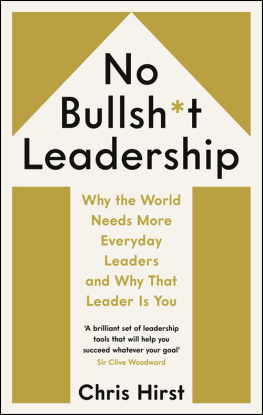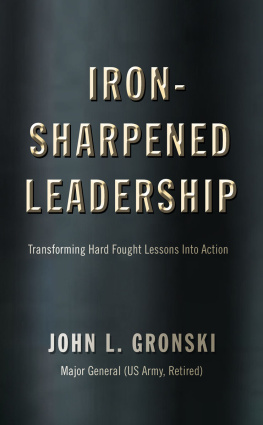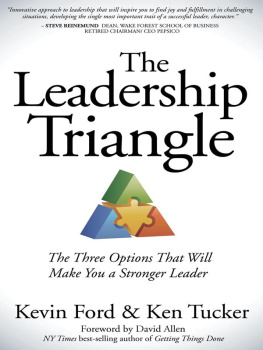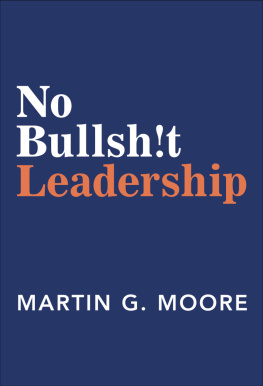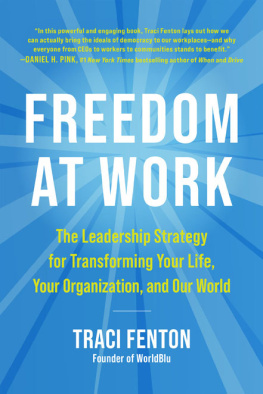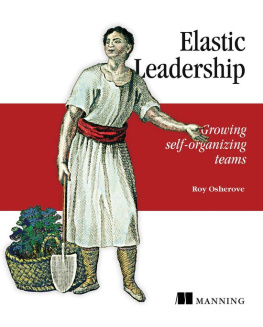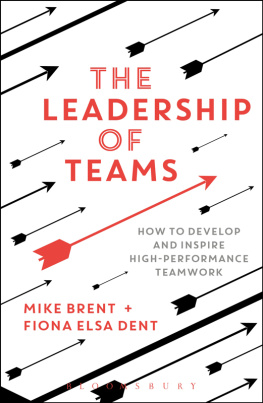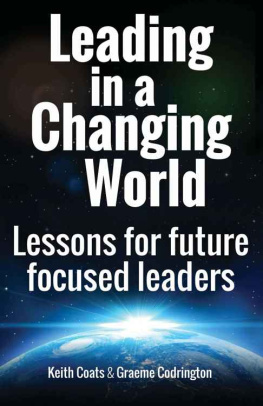No Bullsh*t Leadership
First published in Great Britain in 2019 by
Profile Books Ltd
3 Holford Yard
Bevin Way
London
WC1X 9HD
www.profilebooks.com
Copyright Chris Hirst, 2019
Cover design: Peter Dyer
The moral right of the author has been asserted.
All rights reserved. Without limiting the rights under copyright reserved above, no part of this publication may be reproduced, stored or introduced into a retrieval system, or transmitted, in any form or by any means (electronic, mechanical, photocopying, recording or otherwise), without the prior written permission of both the copyright owner and the publisher of this book.
A CIP catalogue record for this book is available from the British Library.
ISBN 9781788162524
eISBN 9781782835458
CONTENTS
Chris Hirst is Global CEO for Havas Creative Network, a multi-disciplinary marketing services network. He was previously CEO at advertising agency Grey London. Once an engineering graduate working in a glass factory, his career path has taken him to the boardroom via Harvard Business School. Named in 2018s Evening Standard Power 1000 list and ranked one of the industrys most influential CEOs, Chris is a regular commentator in national press including BBC News, The Politics Show, Evening Standard, CNBC, Financial Times and Sky News. Follow him on Twitter @chrishirst.
To Ann, Dylan and Sam
No Bullsh*t Leadership
Why the World Needs More Everyday Leaders and Why That Leader Is You
Chris Hirst

All men dream: but not equally. Those who dream by night in the dusty recesses of their minds wake up in the day to find it was vanity, but the dreamers of the day are dangerous men, for they may act their dreams with open eyes, to make it possible.
Seven Pillars of Wisdom, T. E. Lawrence
FOREWORD
Sir Clive Woodward
NOBODY IS A BORN leader. However, it is something you can learn and develop in yourself, and coach and teach in others. Many assume leadership ability to be determined by personality traits such as self-confidence, charisma and certainty of vision, but in my experience, the two most important skills effective leaders possess are things we can all do if we choose to. The first is to be really good at listening, and the second is to remain permanently curious, open and willing to learn. The days of a remote leader that only very senior people get to speak to are over; everyone today expects to have a voice and be heard. More than ever before, todays successful leaders must be able to listen effectively and learn quickly.
Great leaders recognise that the best ideas wont only come from them. Its not a matter of ceding authority, youre still going to have to take responsibility, say yes or no, but great ideas can and will come from everywhere if you let them. I have never thought that I was particularly good at ideas, but I am good at creating teams that are able to think for themselves. And Im very good at listening and acting on what they tell me.
I have also always loved to learn. Not just from my own experience, but from others whoever or wherever they may be. I will travel anywhere in the world for the opportunity to understand or uncover something that may make me a better leader and coach. Once you view learning as part of your job, youll be amazed at the breadth and variety of people who can teach you something new. I call this relentless learning. When I was head coach of the England Rugby Team on our journey towards the 2003 World Cup we experienced our share of famous victories and unwelcome defeats as all teams do. However, instead of simply celebrating our victories and spending many hours mulling over our defeats, we did the opposite. We brushed off defeats as an inevitable (if unwelcome) part of the job; when they came along we had a beer or two (you still could in those days) and put them behind us. However, when we won, we were determined to learn from it; we were in early the next morning deconstructing what it was we had done right and made sure we were even better next time.
If you are a good listener and a quick learner, then you are well on your way. With these two ingredients, leadership may turn out to be much less complicated than you thought.
I first worked with Chris nearly ten years ago when he was the newly appointed CEO of a business striving to shake off a terrible reputation and with recent performance to match. He approached me because he rightly believed we shared a restless desire to learn, a passion for trying new ways of solving familiar problems and a healthy disrespect for bureaucracy, pomposity and received wisdom. That is how Ive found him ever since. He is as the title of this book suggests.
Chris is one of the most unconventional and successful leaders that I know and this book is about how he works. Hes a great listener and you see here why people enjoy working with and for him. He is, as I like to put it, a sponge rather than a rock. Like all successful leaders, he is tough and driven, but never lets you forget that ultimately leadership is about people and what comes through on these pages is the warmth and humanity with which he approaches his role.
Every page of this book is bursting with thoughtful, yet practical advice, all tried, tested and proven. It is no ego-driven list of achievements, but an honest account of the difficulties, failures and tough choices that are necessarily part of being a leader. And how through clarity of thought, working to develop your own leadership skills, and focusing on action, you too can overcome and succeed.
Leading is about relentless learning and I unhesitatingly recommend this book to anybody who wishes to improve their skills, effectiveness and successes as a leader. No matter who you are, what kind of organisation or size of team you run, theres something here for you. So good luck and trust me, after a couple of hours with this book, you may find its not as difficult as you think.
INTRODUCTION
I HESITATE TO WASTE my time and yours on yet another book about leadership. Yet never has the subject been more important. We look around our world and see millions of people yearning for leaders who can help them fulfil their potential. We need better leaders everywhere, in politics, science and business, in our schools, hospitals and prisons. Where are the great, if often flawed, leaders of the past? We live in a time where people (and particularly, but by no means exclusively, the young) demand leadership by consent, yet paradoxically we see, in our public life at least, the return of the demagogue.
Leadership has become a word devalued by over-promise and underdelivery, by the waffle of business schools and business books, by the perceived failings of politicians and businessmen (and women). This bullshit that surrounds the subject both inhibits people from fulfilling their potential and excludes people from believing they too could lead. Leadership is a word drowning in words, crying out for rescue.
We need not a new word but a new understanding, one that illuminates rather than obscures, includes rather than excludes. We have always previously believed that leaders are the people right at the very top of our public life: politicians and CEOs; generals and dot-com billionaires. This is who business schools and business books speak of and to when you open their covers. However, important though these people may be, they are the 0.0001 per cent; few of us will ever even meet them, never mind actually join their club.

